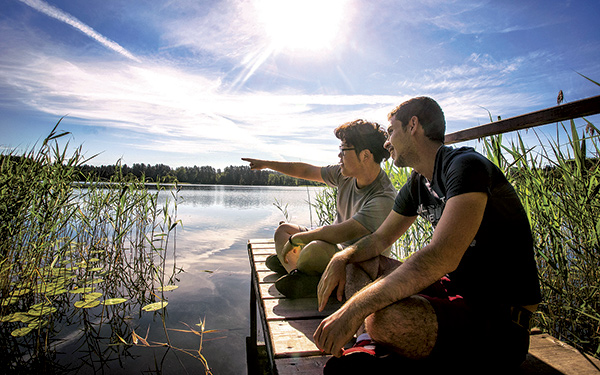
Foreign guests get to know traditions and customs of Rossony area
For two days, students at the Minsk State Linguistic University — a third-year student from Turkey, Ertugrul Besheoglu, and a fourth-year student, Kim Sung Jae, from South Korea — learned to chop wood, mow grass and fry potato pancakes, in the Rossony District.
Rural tourism has grown significantly in popularity in our country, with guests keen to enjoy traditional customs and activities: fishing and boating; horse riding and cycling; lake bathing and Russian baths; visiting local museums of old, rustic utensils and taking cooking master-classes; and excursions to places of historical and cultural interest; and petting domestic animals.
Alla Khoren, from Klyastitsy village, has an excellent view overlooking the River Nishcha. Three cows are on the shore, peacefully eating grass.
“Some time ago, Germans came here to rest,” says the hostess. “They wanted experience, planning to acquire their own farm, and asked me to allow them to milk a cow. They wanted to see if they’d manage. I agreed, although we have our superstitions about not allowing strangers into a barn. Those foreigners were really interested in our way of life: how we heated the stove, made hay, and cooked. Most prefer to watch, but some want to learn.”

Work therapy
The heroes of our story, Ertu and Song Jae, are like this. A scythe and axe are like artefacts from a local history museum to them: as if from the Stone Age. In fact, Ertugrul once visited friends in David-Gorodok, so has some clue about hay, chopping firewood, the rituals of the banya and other rural customs. He had a go at chopping wood, while noting that agriculture became automated long ago in his own counry, with manual labour forgotten.
“Grab the scythe-handle with your left hand, and the other handle with your right,” says Stanislav Kozlov a soloist with Yankovichy folk band Krinitsa. He has come to Klyastitsy to show his friends our country ways, meticulously showing them how to sharpen a scythe’s blade, how to hold it, and the sweeping motion at a certain angle (to avoid being hurt). A good scythe should mow itself.
Kim Sung Jae’s first attempt seems to be a failure, like the first pancake, but then he gets the hang of it.
“Scything is hard work on the muscles,” says Stanislav.
Ertugrul questions why we used scythes when they are so slow but Stanislav asserts that hand cutting of grass keeps you fit. “It can’t be good for you to mow all day under the scorching sun!” comes the reply, but Stanislav asserts that there’s no need to go to a gym when you have a scythe and grass to cut.
He shows the students an axe next and Alla steps forward, to the young men’s bewilderment. In response to their surprised looks, she waves her hand, as if saying: it’s no big deal! In their family, her husband tends to chop logs and she splits these into smaller kindling.

Past remains in modernity
As the boys have a go, I shout, “Stand clear.” I fear that a fragment may fly off, or that they’ll miss, being beginners...
Mikhail Malashenko is teaching this master class, on how to split a birch log. He says, “I’ll do it with one hand but you start with two.”
One swing and the log is split. When you’re physically strong, it’s not difficult and there’s nothing to be afraid of.
Ertugrul and Song Jae share their impressions, saying that there’s no need to use an axe in Turkish or South Korean everyday life, but they found it fun.
As for heating a stove or preparing an outdoor grill, they say that neither are popular in their countries. They don’t gather for barbecues, although they do grill samgyeopsal and bacon. “But we don’t use firewood; we use charcoal,” says Kim Sung Jae.
“If you really need firewood, you can buy it in bundles, prepared by specially trained people,” echoes Ertugrul.

Enchanting land
Naturally, foreign visitors are keen to try local delicacies, and the table at Alla Khoren’s place is heavy with potato dishes, alongside baked tench in sour cream, homemade cheeses and pickles, and various mushrooms, including chanterelles. There are mugs with birch juice and glasses of local liqueur. Instead of compote, there are herbal teas.
Guests are invited to prepare draniki themselves but Ertugrul refuses, saying that he prefers to eat in cafes, although he can cook pasta with various sauces, as well as making Turkish salads and kebabs. He asserts, however, that the best cooks in Turkey are men, although the kitchen is a woman’s realm. His mother always cooks at home.
Song Jae doesn’t mind at all, despite, by his own admission, only knowing how to cook rice. “Have you eaten dog?” we ask, and he admits ‘only once’, diplomatically evading a true answer.
“Don’t cut your fingers,” warns Alla, as he begins grating potatoes, “And don’t make the pancakes so thick.” Ten minutes later, the draniki were ready and it was as if he’d cooked them his whole life.
DIRECT SPEECH
Kim Sung Jae, South Korea:
Compared to our country, yours appears stuck in the 1980s, so it inspires nostalgia from us. This type of tourism will certainly be interesting to my compatriots. For a long time, they had no idea where to go beyond Minsk, or how best to travel. Agencies didn’t seem to offer tours, centrally or individually, with departure from the capital.
Ertugrul Besheoglu, Turkey:
House-stays are your niche, as ‘all inclusive’ hotels are ours. We prefer to relax and be looked after, but people here are independent. You say that, on vacation, one needs to rest. However, for many people, simply changing activity is relaxing. It’s great that you can attract tourists just by doing what you do normally.
By Dmitry Umpirovich











